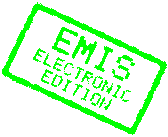Elementary Abelian p -groups of rank greater than or equal to 4 p - 2 are not CI-groups
Pablo Spiga
University of Lethbridge Department of Mathematics and Computer Science 4401 University Drive Lethbridge AB Canada
DOI: 10.1007/s10801-007-0059-2
Abstract
In this paper we prove that an elementary Abelian p-group of rank 4 p - 2 is not a CI (2)-group, i.e. there exists a 2-closed transitive permutation group containing two non-conjugate regular elementary Abelian p-subgroups of rank 4 p - 2, see Hirasaka and Muzychuk (J. Comb. Theory Ser. A 94(2), 339-362, 2001). It was shown in Hirasaka and Muzychuk (loc cit) and Muzychuk (Discrete Math. 264(1-3), 167-185, 2003) that this is related to the problem of determining whether an elementary Abelian p-group of rank n is a CI-group.
As a strengthening of this result we prove that an elementary Abelian p-group E of rank greater or equal to 4 p - 2 is not a CI-group, i.e. there exist two isomorphic Cayley digraphs over E whose corresponding connection sets are not conjugate in Aut\thinspace E.
Pages: 343–355
Keywords: keywords Cayley graph; CI-group; Schur ring; 2-closure
Full Text: PDF
References
1. Babai, L. (1977). Isomorphism problem for a class of point-symmetric structures. Acta Math. Acad. Sci. Hung., 29(3-4), 329-336.
2. The GAP Group (2005). GAP-groups, algorithms, and programming, version 4.4, http://www. gap-system.org.
3. Hirasaka, M., & Muzychuk, M. (2001). An elementary Abelian group of rank 4 is a CI-group. J. Comb. Theory Ser. A, 94(2), 339-362.
4. Lakatoš, P., & Suš\check cans'ki\?ı, V. \?I. (1976). The coincidence of central series in wreath products, I. Russian. Publ. Math. Debrecen, 23(1-2), 167-176.
5. Li, C. H. (2002). On Isomorphisms of finite Cayley graphs-a survey. Discrete Math., 256(1-2), 301- 334.
6. Muzychuk, M. (2003). An elementary Abelian group of large rank is not a CI-group. Discrete Math., 264(1-3), 167-185.
7. Nowitz, L. A. (1992). A non-Cayley-invariant Cayley graph of the elementary Abelian group of order
64. Discrete Math., 110(1-3), 223-228.
8. Robinson, D. J. S. (1980). A course in the theory of groups. Berlin: Springer (pp. 304-305).
9. Wielandt, H. (1964). Finite permutation groups. Berlin: Academic.
2. The GAP Group (2005). GAP-groups, algorithms, and programming, version 4.4, http://www. gap-system.org.
3. Hirasaka, M., & Muzychuk, M. (2001). An elementary Abelian group of rank 4 is a CI-group. J. Comb. Theory Ser. A, 94(2), 339-362.
4. Lakatoš, P., & Suš\check cans'ki\?ı, V. \?I. (1976). The coincidence of central series in wreath products, I. Russian. Publ. Math. Debrecen, 23(1-2), 167-176.
5. Li, C. H. (2002). On Isomorphisms of finite Cayley graphs-a survey. Discrete Math., 256(1-2), 301- 334.
6. Muzychuk, M. (2003). An elementary Abelian group of large rank is not a CI-group. Discrete Math., 264(1-3), 167-185.
7. Nowitz, L. A. (1992). A non-Cayley-invariant Cayley graph of the elementary Abelian group of order
64. Discrete Math., 110(1-3), 223-228.
8. Robinson, D. J. S. (1980). A course in the theory of groups. Berlin: Springer (pp. 304-305).
9. Wielandt, H. (1964). Finite permutation groups. Berlin: Academic.
© 1992–2009 Journal of Algebraic Combinatorics
©
2012 FIZ Karlsruhe /
Zentralblatt MATH for the EMIS Electronic Edition
